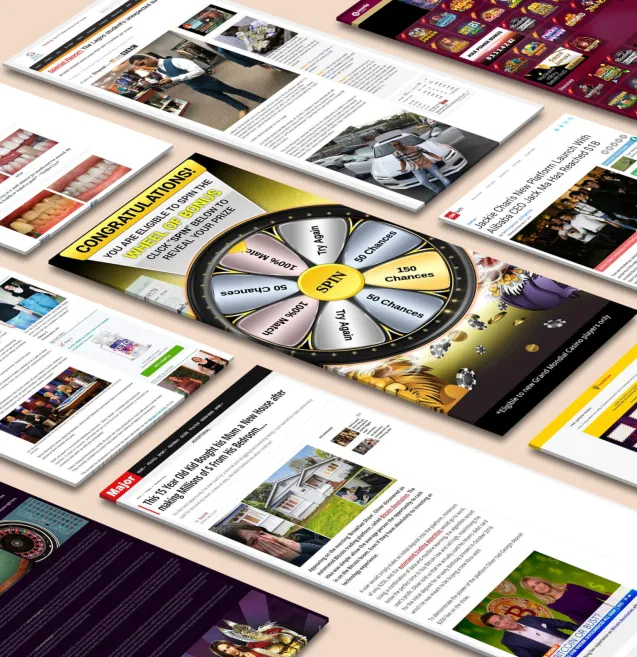
Наши инструменты отслеживают миллионы рекламных кампаний в форматах native, push, pop и TikTok.
НачатьПартнёрский маркетинг продолжает развиваться как один из самых динамичных маркетинговых каналов, ориентированных на результат, объединяя бренды с издателями, которые продвигают товары в обмен на комиссионное вознаграждение. Вступая в 2025 год, эта отрасль переживает беспрецедентные изменения, вызванные технологическими прорывами, изменяющимся поведением потребителей и изменениями в законодательстве, которые меняют подход компаний к партнёрскому маркетингу.
Ландшафт партнёрского маркетинга 2025 представляет собой сложную комбинацию захватывающих возможностей и значительных вызовов. От оптимизации кампаний с помощью ИИ до решений отслеживания с приоритетом конфиденциальности, будущее партнёрского маркетинга требует стратегической адаптации и нестандартного мышления. Бренды, понимающие эти возникающие тенденции, смогут воспользоваться новыми рыночными возможностями и преодолеть отраслевые вызовы.
В этом подробном анализе рассматриваются семь ключевых тенденций, которые определят успех в партнёрском маркетинге в 2025 году. Вы узнаете, как консолидация отрасли меняет конкурентную динамику, почему рост торговых медиа создаёт новые возможности для партнёрства и как эволюция контента открывает двери к подлинному вовлечению аудитории. Каждая тенденция несёт в себе как многообещающие возможности, так и сложные вызовы, которые требуют тщательного обдумывания и стратегического планирования для максимизации потенциала партнёрского маркетинга.
Если вы хотите глубже погрузиться в мир партнёрского маркетинга или даже присоединиться к партнёрской программе, такой как Anstrex, в вашем распоряжении огромное количество ресурсов, которые помогут вам на этом пути.
Мир партнерского маркетинга претерпевает существенные изменения, поскольку крупные игроки трансформируют конкурентную среду за счет стратегических приобретений. Традиционные границы между брендами, агентствами и партнерскими сетями стираются, появляются новые гибридные бизнес-модели, объединяющие различные возможности в рамках одного предприятия.
Слияния и поглощения происходят с удивительной скоростью: устоявшиеся бренды покупают специализированные партнерские агентства, чтобы переместить экспертизу внутрь компании и получить прямой контроль над каналами performance-маркетинга. Такие компании, как Amazon, Walmart и Target, существенно инвестируют в приобретение технологических платформ и квалифицированных специалистов в сфере партнерского маркетинга, понимая, что собственные компетенции обеспечивают лучший контроль данных и оптимизацию кампаний.
Эти партнерства между брендами и аффилиатами создают мощные преимущества для обеих сторон:
Последствия для рынка значительны. Небольшие независимые партнеры теперь испытывают большее давление: им необходимо быстро расти или находить узкие ниши, которые крупные консолидированные игроки не смогут легко повторить. Конкуренция обостряется, поскольку объединяющиеся компании используют свои расширенные ресурсы для доминирования в высокодоходных отраслях и получения премиальных партнерских возможностей.
Вы заметите, что успешные бренды больше не просто ищут партнеров: они создают комплексные экосистемы performance-маркетинга, интегрируя партнерские возможности в основные бизнес-процессы. Такая интеграция приводит к стратегическим инсайтам, которые дают им конкурентное преимущество на множестве каналов.
Рост ритейл-медиа изменил ландшафт партнерского маркетинга, создав беспрецедентные возможности для брендов в привлечении потребителей на ключевых этапах принятия решений. Крупные ритейлеры, такие как Amazon, Walmart и Target, создали сложные рекламные экосистемы, генерирующие миллиарды долларов дохода, что укрепило их позиции как важных партнеров в партнерской маркетинговой цепочке.
Бурный рост розничных медиа-сетей создает уникальные вызовы для партнерства с брендами. Вам необходимо понять, что эти платформы функционируют иначе, чем традиционные партнерские каналы. Теперь ритейлеры контролируют ценную информацию первичных данных и сигналы о покупательских намерениях, что делает их мощными посредниками между брендами и потребителями.
Партнеры играют ключевую роль в устранении пробелов конверсии на средних этапах воронки продаж, которые ритейлеры часто не могут заполнить. Хотя ритейл-медиа отлично справляются с привлечением покупателей с высоким уровнем намерений, они часто упускают потребителей, находящихся на стадии рассмотрения. Умные партнеры преодолевают этот разрыв следующим образом:
Наиболее успешные партнерские стратегии в 2025 году ориентированы на подталкивание, а не на прямое давление. Вы можете достичь более высоких показателей конверсии, позиционируя розничные платформы как естественный следующий шаг в пути клиента. Такой подход требует глубокого понимания моделей поведения потребителей и стратегического размещения контента, который воспринимается органично, а не как реклама.
Данные показывают, что партнеры, освоившие оптимизацию средних этапов воронки, отмечают улучшение конверсии на 40–60%, когда направляют трафик на платформы ритейл-медиа.
ИИ в партнерском маркетинге трансформирует управление кампаниями и оптимизацию эффективности в 2025 году. Алгоритмы машинного обучения теперь осуществляют корректировку ставок в режиме реального времени, автоматически распределяя бюджет на наиболее эффективные размещения и останавливая неэффективные. Вы можете использовать такие платформы, как Impact Radius и PartnerStack, которые интегрируют оптимизацию на основе ИИ, чтобы максимизировать отдачу от рекламных расходов без постоянного ручного вмешательства.
Принятие решений на основе данных достигает нового уровня благодаря прогнозной аналитике, которая выявляет ваших самых эффективных партнеров до выхода их на пик. Системы ИИ анализируют паттерны конверсий, показатели вовлеченности аудитории и сезонные тенденции, чтобы предсказать, какие партнеры принесут наибольшую долгосрочную прибыль. Вы получаете доступ к таким аналитическим данным, как:
Формирование лояльной аудитории становится критически важным по мере дальнейшего снижения органического трафика на основных платформах. Персонализационные движки на основе ИИ помогают создавать таргетированный контент, который находит отклик у конкретных сегментов аудитории. Интеллектуальные рекомендательные системы отслеживают поведение пользователя на всех сенсорах, позволяя предлагать релевантные товары, повышая уровень вовлеченности до 40%.
Эти Тенденции партнерского маркетинга 2025: Возможности и вызовы делают ИИ вашим конкурентным преимуществом для масштабирования кампаний с одновременным контролем качества в расширяющихся сетях партнеров.
Видеоонтент стал движущей силой успеха в партнерском маркетинге: создатели контента и инфлюенсеры используют такие платформы, как TikTok, YouTube и Instagram, чтобы демонстрировать товары через увлекательное визуальное повествование. Вы можете увидеть рост показателя конверсии на 80%, когда партнеры используют видеодемонстрации по сравнению с обычным статическим контентом.
Эта сфера выходит далеко за рамки традиционных видеопостов. Интерактивный партнерский контент теперь охватывает множество точек взаимодействия, формируя погружающий опыт покупок:
Такие форматы обеспечивают более высокую вовлеченность, поскольку предлагают ценность, выходящую за рамки простого продвижения продукта. Когда вы смотрите прямую трансляцию с покупками, вы участвуете в интерактивном опыте, а не потребляете пассивную рекламу.
Переход к интерактивному партнерскому контенту отражает изменяющиеся предпочтения потребителей в пользу подлинного и увлекательного опыта. Создатели, освоившие несколько форматов контента, могут диверсифицировать свои источники дохода и укреплять отношения со своей аудиторией. Бренды, сотрудничающие с такими создателями, зачастую наблюдают рост конверсии на 40–60% по сравнению с традиционной баннерной рекламой.
Мир партнерского маркетинга переживает существенные изменения в подходах к интеграции маркетинга влияния. Бренды понимают, что небольшие создатели контента достигают более высоких результатов, чем знаменитости. Микроинфлюенсеры, у которых от 1 000 до 100 000 подписчиков, стабильно показывают конверсию на 60–70% выше, чем мегаинфлюенсеры.
Этот сдвиг происходит потому, что микроинфлюенсеры тесно связаны со своей аудиторией. Их рекомендации воспринимаются как личное одобрение, а не как оплаченная реклама. Эти создатели активно взаимодействуют со своими подписчиками, отвечая на комментарии, делясь закулисным контентом и формируя подлинные сообщества на основе общих интересов и ценностей.
Аутентичность в рекламе становится ключом к успешным партнерским кампаниям, когда традиционные партнерские стратегии комбинируются с сотрудничеством с инфлюенсерами. Создатели, которые органично включают рекомендации продуктов в свое повествование, демонстрируют более высокие показатели вовлеченности и направляют более качественный трафик по партнерским ссылкам.
Такой подход к интеграции особенно эффективен в различных форматах контента:
Умные бренды устанавливают долгосрочные отношения с этими создателями, переходя от разовых платных публикаций к настоящему брендингу амбассадоров. Эта стратегия укрепляет доверие аудитории, которая ценит искренние рекомендации больше, чем очевидную рекламу, создавая устойчивые источники дохода как для партнеров, так и для брендов.
Правила конфиденциальности продолжают менять способы отслеживания и измерения эффективности партнерского маркетинга в 2025 году. Постоянное развитие GDPR, CCPA и появление новых нормативных актов о конфиденциальности в различных юрисдикциях вынуждают партнерских маркетологов переосмыслить свои стратегии сбора данных и атрибуции.
Традиционные методы отслеживания сталкиваются с серьезными ограничениями по мере отказа от сторонних куки и ужесточения ограничений в браузерах. Интеллектуальное предотвращение отслеживания в Safari и инициатива Privacy Sandbox в Chrome уже нарушили обычные методы партнерского отслеживания, вынуждая переходить к более сложным решениям.
Сбор первичных данных становится вашим конкурентным преимуществом в условиях приватности. Вам необходимо выстраивать прямые отношения с клиентами посредством:
Отслеживание сервер-сервер становится надежной альтернативой атрибуции на основе куки. Этот метод обрабатывает данные непосредственно между серверами, обходя ограничения браузеров и сохраняя точность. Вероятностное отслеживание дополняет этот подход, используя статистические модели для выявления путей пользователя на разных устройствах и платформах.
Соблюдение норм конфиденциальности требует прозрачности в партнерских отношениях. Вы должны четко раскрывать партнерские связи, внедрять надлежащие механизмы согласия и обеспечивать обработку данных в соответствии с региональными правилами. Бренды, успешно преодолевающие эти Тренды партнерского маркетинга 2025: возможности и вызовы, активно инвестируют в инфраструктуру соответствия требованиям и юридическую экспертизу, чтобы сохранять конкурентоспособность и при этом уважать приватность пользователей.
Географическая экспансия партнёрского маркетинга открывает новые возможности, поскольку бренды осознают потенциал развивающихся рынков. Азия, Латинская Америка и Африка являются наиболее быстрорастущими регионами в сфере партнёрского маркетинга, что обусловлено увеличением числа людей, получающих доступ к интернету, использующих мобильные устройства и имеющих более высокие располагаемые доходы.
Контент-стратегии, адаптированные под конкретные регионы, играют ключевую роль в достижении успеха на этих рынках. Важно понимать культурные различия, местные способы оплаты и привычки потребителей, чтобы разрабатывать эффективные партнёрские кампании. Например, в Китае основной платформой для партнёрского маркетинга являются мини-программы WeChat, тогда как в Латинской Америке и Африке продажи активно ведутся через WhatsApp Business.
Ниже приведены основные стратегии, которые помогут добиться успеха на развивающихся рынках:
Международные партнёрские программы упрощают выход международных брендов на взаимодействие с местными партнёрами. Эти программы используют современные системы отслеживания, способные работать с различными валютами, налоговыми законами и требованиями соответствия в разных странах.
Такие бренды, как Amazon, AliExpress и Shopee, показали, насколько успешные международные программы могут расширять масштабы партнёрского маркетинга по всему миру, оставаясь при этом актуальными для местных рынков. Вы можете воспользоваться этими возможностями, сотрудничая с проверенными сетями, способными работать на нескольких рынках и предоставляющими поддержку с локализацией.
Ландшафт Трендов партнерского маркетинга 2025: возможности & вызовы требует кардинального изменения подхода к партнерствам и стратегиям кампаний. Успех зависит от вашей способности принять инновации, адаптивность, использование технологий, сохраняя при этом подлинные связи с вашей аудиторией.
Стратегические инсайты партнерского маркетинга 2025 показывают, что бренды, преуспевающие в этой среде, обладают общими характеристиками:
Вы не можете позволить себе рассматривать эти тенденции как необязательные улучшения. Бренды, инвестирующие в серверное отслеживание, развитие партнерств с микроблогерами и выход на новые рынки, создают основу для устойчивого роста.
Экосистема партнерского маркетинга вознаграждает тех, кто быстро адаптируется к регуляторным изменениям, использует передовые технологии и поддерживает подлинные отношения со своими партнерами. Ваше конкурентное преимущество заключается в проактивном решении вопросов соблюдения конфиденциальности, использовании инсайтов на основе ИИ и создании подлинных партнерств с создателями контента.
Действуйте уже сейчас: проверьте свою текущую партнерскую стратегию, выявите пробелы в технологиях и начните тестировать новые форматы до того, как это сделают ваши конкуренты.
Получайте лучшие конверсионные лендинги каждую неделю на свою почту.
Объявление
Rachel Thompson
7 миндек. 20, 2025
Инструкция
Завершение поддержки сторонних куки меняет аффилированный маркетинг, но адаптация открывает новые возможности. Узнайте, как внедрить отслеживание, безопасное для конфиденциальности, которое сохраняет точность и эффективность. Ознакомьтесь с технологиями и стратегиями, позволяющими защитить ваши кампании от будущих изменений и обеспечить соответствие требованиям в 2025 году. Идеально подходит для аффилированных лиц, намеренных процветать в цифровой среде без использования куки.
Samantha Reed
7 миндек. 14, 2025
Инструкция
Праздничный сезон открывает непревзойденные возможности для партнеров, желающих максимизировать свой доход. Узнайте, как разработать стратегию на конец года, используя временные предложения, сезонные тенденции и аналитику аудитории. Откройте для себя конкретные способы оптимизации кампаний и увеличения конверсий до конца года. Идеально подходит для партнеров, стремящихся превратить праздничный трафик в постоянный доход.
Samantha Reed
7 миндек. 6, 2025



